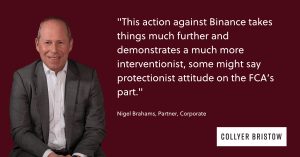- FinTech
- Financial services
- Financial services

Longer Reads
Is the post COVID-19 world a cashless one?
The start of lockdown in March 2020 saw the use of cash in the UK halve in a matter of days. Has this begun a move towards becoming a cashless society? What are the benefits, opportunities, and concerns of such a change?
2 minute read
Published 12 June 2020
Key information
The start of lockdown in March saw the use of cash in the UK halve in a matter of days. This was spurred by the closure of shops, an increase in online sales, a shift to contactless payments and concerns that cash may transport the virus, with some shops refusing to accept cash during the crisis. We are likely to see more of this as shops begin to reopen and shop owners look for ways to protect workers and customers from the spread of infection.
On 23 March, shops and banks agreed to raise the limit for contactless payments from £30 to £45. There was already no limit on the amount a customer can spend using Apple Pay, though some shops imposed their own limits. Figures suggest that ATM usage is down by 50-65%.
A cashless society has its benefits. It is quicker and cheaper. It is estimated that a cash society costs the government £5 billion a year to run, and this is paid mostly by commercial banks who pass costs on to consumers.
A cashless society would reduce the risks of petty theft and cash-in-hand tax avoidance, without automatic paper trails reducing the risks of some financial crime. Mobile banking apps also provide control and access to consumers more readily.
Issues raised in regards a cashless society in the UK centre around concerns about members of society who will be disenfranchised by a cashless society. These include those who are not technologically literate and those without bank accounts or bank cards. It is estimated that as many as 1.3 million adults do not have a bank account in the UK. Individuals with poor credit history may have difficulty in obtaining a bank card, and some households rely heavily on cash. Many older people manage their affairs in cash, and digital payments may mean them having to hand over control of their affairs to someone else. There is also an increased risk of debt for those who budget using cash and struggle to manage their money online.
Some opposition is also raised on a privacy front, as critics believe that the government (and other entities) will have a greater access to information about our finances. This is also a concern in light of the major data breaches we continue to see each year.
Fraud and hacking also pose threats in a cashless society alongside technical issues, which could leave users with no alternative source of money. This could be solved by diversifying cash locations (similar to not leaving all your cash in one place), but this increases complexity for those already struggling with online banking.
The biggest barrier to a cashless society will arguably be people and those who are not willing or able to adopt it. There have been calls for legislative or FCA intervention to require shops and banks to continue to deal in cash, particularly as we see a societal shift. The Access to Cash Review called on the Government to overhaul laws stopping shops from offering cashback without making a purchase, to improve access to cash, as we shift towards a cashless society. In March’s budget the Government said it would legislate to protect access to cash for as long as people needed it. Campaigners have asked for this legislation to be accelerated following the COVID-19 crisis and lockdown to avoid excluding those who rely on cash and face-to-face banking.
Solutions may come in the form of FinTech, and work is being done to create some form of Digital Governance to provide confidence to consumers using digital finance. FinTech solutions are being developed to assist electronic payments without bank accounts and improving customer banking experiences.
Questions have been raised as to whether a move towards a cashless society would become a move towards cryptocurrencies. However, this is arguably conflating two different issues. Crypto has its benefits, though it looks unlikely to surpass fiat currency in the western world anytime soon. To become a cashless society does not require cryptocurrency.
Although we have arguably been moving towards a cashless society for some time, COVID-19 appears to have accelerated the process. It may be helping overcome one of the greatest challenges to a cashless society, people. Studies suggest that it takes around 30 days to adopt a new habit, and as many become increasingly reliant on cashless payments, and with the sustained closure of bank branches, a new habit may be forming for those who relied on cash before lockdown.
It may not be long before we look at a £5 note the way we now look at a VHS, and it will be interesting to see how the trend shifts or sticks during the easing of lockdown. In the long term it will be interesting to see whether there will be a wholesale shift to a cashless society or a gradual decline in cash use.
Related content
Longer Reads
Is the post COVID-19 world a cashless one?
The start of lockdown in March 2020 saw the use of cash in the UK halve in a matter of days. Has this begun a move towards becoming a cashless society? What are the benefits, opportunities, and concerns of such a change?
Published 12 June 2020
Associated sectors / services
The start of lockdown in March saw the use of cash in the UK halve in a matter of days. This was spurred by the closure of shops, an increase in online sales, a shift to contactless payments and concerns that cash may transport the virus, with some shops refusing to accept cash during the crisis. We are likely to see more of this as shops begin to reopen and shop owners look for ways to protect workers and customers from the spread of infection.
On 23 March, shops and banks agreed to raise the limit for contactless payments from £30 to £45. There was already no limit on the amount a customer can spend using Apple Pay, though some shops imposed their own limits. Figures suggest that ATM usage is down by 50-65%.
A cashless society has its benefits. It is quicker and cheaper. It is estimated that a cash society costs the government £5 billion a year to run, and this is paid mostly by commercial banks who pass costs on to consumers.
A cashless society would reduce the risks of petty theft and cash-in-hand tax avoidance, without automatic paper trails reducing the risks of some financial crime. Mobile banking apps also provide control and access to consumers more readily.
Issues raised in regards a cashless society in the UK centre around concerns about members of society who will be disenfranchised by a cashless society. These include those who are not technologically literate and those without bank accounts or bank cards. It is estimated that as many as 1.3 million adults do not have a bank account in the UK. Individuals with poor credit history may have difficulty in obtaining a bank card, and some households rely heavily on cash. Many older people manage their affairs in cash, and digital payments may mean them having to hand over control of their affairs to someone else. There is also an increased risk of debt for those who budget using cash and struggle to manage their money online.
Some opposition is also raised on a privacy front, as critics believe that the government (and other entities) will have a greater access to information about our finances. This is also a concern in light of the major data breaches we continue to see each year.
Fraud and hacking also pose threats in a cashless society alongside technical issues, which could leave users with no alternative source of money. This could be solved by diversifying cash locations (similar to not leaving all your cash in one place), but this increases complexity for those already struggling with online banking.
The biggest barrier to a cashless society will arguably be people and those who are not willing or able to adopt it. There have been calls for legislative or FCA intervention to require shops and banks to continue to deal in cash, particularly as we see a societal shift. The Access to Cash Review called on the Government to overhaul laws stopping shops from offering cashback without making a purchase, to improve access to cash, as we shift towards a cashless society. In March’s budget the Government said it would legislate to protect access to cash for as long as people needed it. Campaigners have asked for this legislation to be accelerated following the COVID-19 crisis and lockdown to avoid excluding those who rely on cash and face-to-face banking.
Solutions may come in the form of FinTech, and work is being done to create some form of Digital Governance to provide confidence to consumers using digital finance. FinTech solutions are being developed to assist electronic payments without bank accounts and improving customer banking experiences.
Questions have been raised as to whether a move towards a cashless society would become a move towards cryptocurrencies. However, this is arguably conflating two different issues. Crypto has its benefits, though it looks unlikely to surpass fiat currency in the western world anytime soon. To become a cashless society does not require cryptocurrency.
Although we have arguably been moving towards a cashless society for some time, COVID-19 appears to have accelerated the process. It may be helping overcome one of the greatest challenges to a cashless society, people. Studies suggest that it takes around 30 days to adopt a new habit, and as many become increasingly reliant on cashless payments, and with the sustained closure of bank branches, a new habit may be forming for those who relied on cash before lockdown.
It may not be long before we look at a £5 note the way we now look at a VHS, and it will be interesting to see how the trend shifts or sticks during the easing of lockdown. In the long term it will be interesting to see whether there will be a wholesale shift to a cashless society or a gradual decline in cash use.
Associated sectors / services
- FinTech
- Financial services
- Financial services
Need some more information? Make an enquiry below.
Enjoy reading our articles? why not subscribe to notifications so you’ll never miss one?
Subscribe to our articlesMessage us on WhatsApp (calling not available)
Please note that Collyer Bristow provides this service during office hours for general information and enquiries only and that no legal or other professional advice will be provided over the WhatsApp platform. Please also note that if you choose to use this platform your personal data is likely to be processed outside the UK and EEA, including in the US. Appropriate legal or other professional opinion should be taken before taking or omitting to take any action in respect of any specific problem. Collyer Bristow LLP accepts no liability for any loss or damage which may arise from reliance on information provided. All information will be deleted immediately upon completion of a conversation.
Close

























































